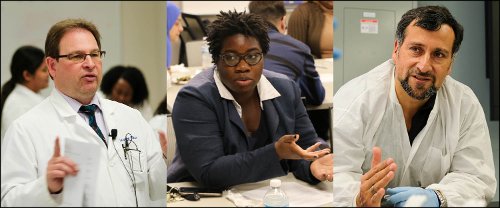
Three Oakland University William Beaumont School of Medicine professors have spent the last week developing a two-week course aimed at preparing medical students likely to soon be treating patients with COVID-19.
Designed as a graduate seminar course, “M4 Elective COVID 19/Pandemic” was co-created by Dwayne Baxa, Ph.D., assistant professor of microbiology, Claudio Cortes, Ph.D., assistant professor of immunology, and Kyeorda Kemp, Ph.D., assistant professor of immunology — all from OUWB’s Department of Foundational Medical Studies.
Baxa said the course was developed within the last week with two primary goals: provide students with information directly related to COVID-19 and help them understand the dynamics of pandemics and epidemics in general.
The course was developed and launched for fourth-year (M4) medical students at OUWB, though Baxa said it’s also been made available to third-year (M3) students. A similar “general knowledge” course also has been developed.
“The hope is this information will be used to prepare all of our M4s for being out in the field during this crisis,” he said.
Kemp said the class — which started this week — is particularly unique in that it addresses one disease.
“We typically do not dedicate a whole course to one disease,” she said.
“Students learn about coronaviruses in the context of the common cold in Respiratory (courses), but here, we are discussing this virus in the context of a pandemic.”
Course structure
Baxa said the course is broken into five different topic areas: virology, epidemiology, treatment and vaccine development, pathophysiology, and impact to the community. As such, it drew on the expertise of Baxa, Cortes, and Kemp.
The course includes students breaking off into groups and with each focused on one of the topics.
Baxa said the groups each will be responsible for researching the specific topic they picked.
“Part of the course is students being able to find or identify sources of information from credible sources and cultivate that data into presentations,” he said. “Then the presentations will be given toward the end of the course to the group in general.”
Baxa said the group will then have a larger discussion about each of the five topic areas. Those discussions would be used to refine the separate presentations.
“The groups would then record the presentations at the end of the two-week period and then those recordings would be utilized to help instruct other students because not everyone is able to take this particular course at this time,” Baxa said.
The overall hope, he said, is that the medical students who participate in the class “will be well-prepared for what they’re going to be stepping into in their professional life,” especially since many will be on what Baxa called the forefront of the current pandemic.
“Hopefully, they’ll be prepared for what they see, be able to diagnose, and have an understanding of personal protective equipment and how it’s utilized to not just keep the patient safe and prevent transmission, but also for protection of professionals in the workplace,” he said.
Kemp added that she hopes the course “provides students a greater understanding of the pathyophysiology of SARS-COV-2 (the virus that causes COVID-19) and the treatment and prevention related to the current pandemic.”
Beyond elective
Baxa said that in addition to the M4 elective — which would allow students to earn credits — a separate “general knowledge” course has been developed that focuses on pandemic preparedness and highlighting the importance of personal and community-based preventative measures. The course draws information from various sources, such as Johns Hopkins University, which has developed an online Coronavirus Resource Center.
Kemp said both courses are all about helping participants learn how to research topics like COVID-19.
“While many of our students are staying abreast of the current pandemic and health crisis, they may not be aware of valuable sources of information,” she said.
Baxa said the class was developed at the last minute as a result of the fluid nature of the COVID-19 pandemic.
“We didn’t know much about this before December, and we certainly weren’t aware of what the impact would be until more recently,” he said.
Additionally, Baxa said, there are some differences between the current coronavirus pandemic and other coronaviruses, which typically are the cause of the common cold (with the exception of outliers like the SARS outbreak in the early 2000s and MIERS in 2012).
“Physicians are calling us now because they’re going through their medical school notes and coronaviruses aren’t really mentioned much because they aren’t usually a big problem with pathogenesis beyond common cold and contributing to viral pneumonia,” he said.
For more information, contact Andrew Dietderich, marketing writer, OUWB, at [email protected].
Follow OUWB on Facebook, Twitter, and Instagram.
NOTICE: Except where otherwise noted, all articles are published under a Creative Commons Attribution 3.0 license. You are free to copy, distribute, adapt, transmit, or make commercial use of this work as long as you attribute Oakland University William Beaumont School of Medicine as the original creator and include a link to this article.

